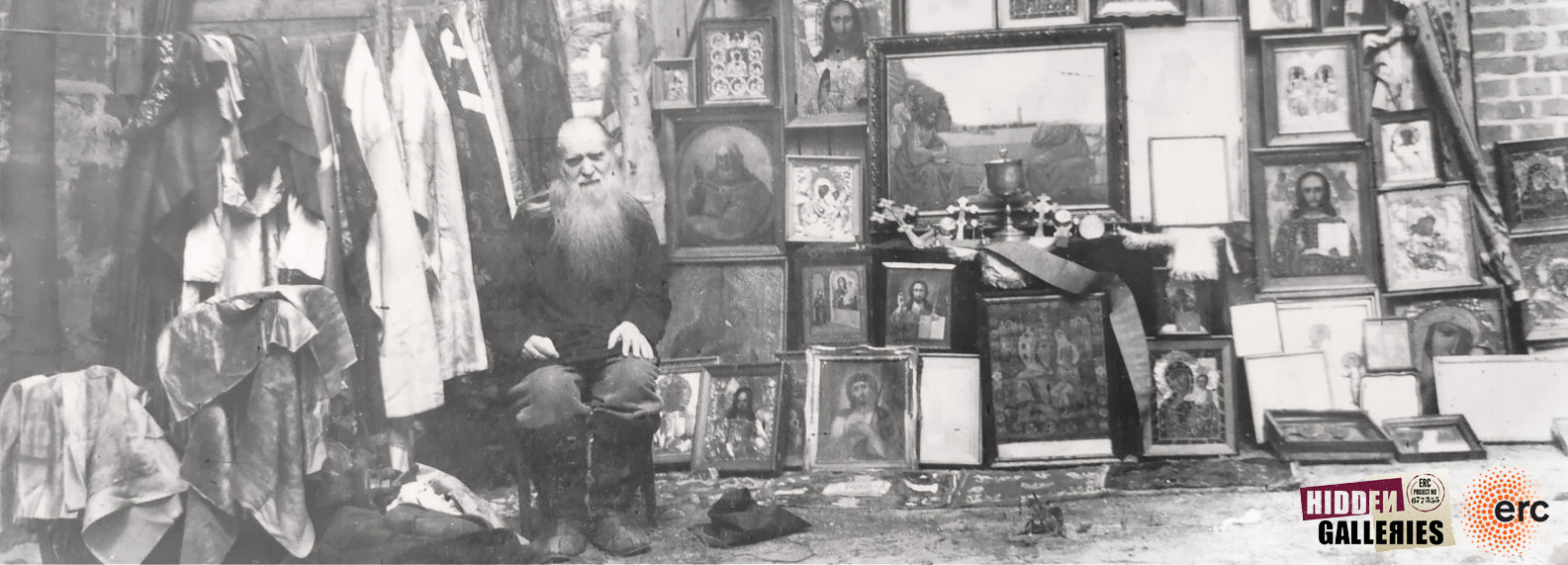Letters renouncing membership of the Romanian Orthodox Church
Item
Title
Letters renouncing membership of the Romanian Orthodox Church
Scrisori care denunță apartenența la Biserica Ortodoxă Română
Description
The four images are of letters from members of the Romanian Orthodox Church community expressing their desire to leave the church.
The almost identical, handwritten, signed and dated (spring 1973) letters were sent to the Romanian Orthodox parish in Lugoj. The second and third letters were written by the same person on behalf of different family members. The authors inform the Orthodox Church in Lugoj that they are leaving the Orthodox Church. The final letter, which was written in the name of an entire family, states that if by mistake they were registered as children with the Orthodox Church they respectfully ask to be removed from the church records and with this act they declare themselves Roman Catholic believers.
According to the explanations given to the Ministry for Religious Denominations by the Orthodox Archbishop of Banat, within whose jurisdiction Lugoj was situated, the authors of the letters were former Greek Catholic believers that joined the Orthodox Church in 1948. The Archbishops communication goes on to identify the authors as older and helpless members of the former Greek Catholic Church, one of which was a bedridden former Greek Catholic priest. These letters, which were required according to the Law for the General State of the Religious Denominations, chapter 5, articles 38 and 39 that outlines the official process of leaving one denomination and joining another, were considered part of a larger campaign by the underground Greek Catholic Church aimed at the legalisation of the church by the communist regime. The letters demonstrate that the Greek Catholic community was still active in the 1970s and that its members were openly leaving the Orthodox Church in protest at the 1948 forced unification. Moreover, especially the forth letter shows that after the forceful unification between the Orthodox and the Greek Catholic Church the believers of the latter were, in some cases, registered as Orthodox without their knowledge or agreement.
The letters ended up at the secret police via the Ministry for Religious Denominations where they were received together with the Orthodox Archbishop’s letter requesting the ministry’s help in discovering who instigated this action and solutions for the problems it raised. The matter was investigated by the secret police and deemed not dangerous. The officers leading the investigation reported that the authors of the letters were old and the sole reason they had drafted them was so they could prepare for their death. The Roman Catholic Church could not or would not officiate at the funerals of nominally registered Orthodox believers and thus the authors of the letters had to officially leave the Orthodox Church even if, at least in some cases, they had never officially joined it.
The letters are part of a larger file on the Catholic problem in Romania CNSAS D69 vol 9. The documentary file regarding this matter contains a letter between the Orthodox Archbishop and the Ministry for Religious Denominations, communication between the Ministry and the secret police, the originals and several copies of the letters and a document with the results of the secret police investigation.
The almost identical, handwritten, signed and dated (spring 1973) letters were sent to the Romanian Orthodox parish in Lugoj. The second and third letters were written by the same person on behalf of different family members. The authors inform the Orthodox Church in Lugoj that they are leaving the Orthodox Church. The final letter, which was written in the name of an entire family, states that if by mistake they were registered as children with the Orthodox Church they respectfully ask to be removed from the church records and with this act they declare themselves Roman Catholic believers.
According to the explanations given to the Ministry for Religious Denominations by the Orthodox Archbishop of Banat, within whose jurisdiction Lugoj was situated, the authors of the letters were former Greek Catholic believers that joined the Orthodox Church in 1948. The Archbishops communication goes on to identify the authors as older and helpless members of the former Greek Catholic Church, one of which was a bedridden former Greek Catholic priest. These letters, which were required according to the Law for the General State of the Religious Denominations, chapter 5, articles 38 and 39 that outlines the official process of leaving one denomination and joining another, were considered part of a larger campaign by the underground Greek Catholic Church aimed at the legalisation of the church by the communist regime. The letters demonstrate that the Greek Catholic community was still active in the 1970s and that its members were openly leaving the Orthodox Church in protest at the 1948 forced unification. Moreover, especially the forth letter shows that after the forceful unification between the Orthodox and the Greek Catholic Church the believers of the latter were, in some cases, registered as Orthodox without their knowledge or agreement.
The letters ended up at the secret police via the Ministry for Religious Denominations where they were received together with the Orthodox Archbishop’s letter requesting the ministry’s help in discovering who instigated this action and solutions for the problems it raised. The matter was investigated by the secret police and deemed not dangerous. The officers leading the investigation reported that the authors of the letters were old and the sole reason they had drafted them was so they could prepare for their death. The Roman Catholic Church could not or would not officiate at the funerals of nominally registered Orthodox believers and thus the authors of the letters had to officially leave the Orthodox Church even if, at least in some cases, they had never officially joined it.
The letters are part of a larger file on the Catholic problem in Romania CNSAS D69 vol 9. The documentary file regarding this matter contains a letter between the Orthodox Archbishop and the Ministry for Religious Denominations, communication between the Ministry and the secret police, the originals and several copies of the letters and a document with the results of the secret police investigation.
Cele patru imagini reprezintă scrisori ale membrilor comunității Bisericii Ortodoxe Române care își exprimă dorința de a părăsi biserica.
Scrisorile aproape identice, scrise de mână, semnate și datate (primăvara anului 1973), au fost trimise parohiei ortodoxe române din Lugoj. A doua și a treia scrisoare au fost scrise de aceeași persoană în numele diferiților membri ai familiei. Autorii informează Biserica Ortodoxă din Lugoj că părăsesc Biserica Ortodoxă. Scrisoarea finală, care a fost scrisă în numele unei întregi familii, afirmă că, dacă din greșeală au fost înregistrați în calitate de credincioși ai Bisericii Ortodoxe, ei solicită cu respect să fie scoși din evidența bisericii și, prin acest document, se declară credincioși romano-catolici.
Potrivit explicațiilor date de mitropolitul ortodox al Banatului, în a cărui jurisdicție se afla Lugojul, către Departamentul Cultelor, autorii scrisorilor erau foști credincioși greco-catolici care au intrat în Biserica Ortodoxă în anul 1948. Comunicarea mitropolitului continuă să identifice autorii ca membri în vârstă și neajutorați ai fostei biserici greco-catolice, dintre care unul era un fost preot greco-catolic țintuit la pat. Aceste scrisori, care erau necesare în conformitate cu Legea pentru Statutul General al Cultelor, capitolul 5, articolele 38 și 39, care subliniază procesul oficial de părăsire a unei confesiuni și aderarea la alta, au fost considerate parte a unei campanii mai ample a Bisericii Greco-Catolice din clandestinitate vizând legalizarea acesteia de către regimul comunist. Scrisorile demonstrează că comunitatea greco-catolică era activă în anii `70 și că membrii acesteia părăseau în mod deschis Biserica Ortodoxă în semn de protest la unificarea forțată din 1948. Mai mult decât atât, în special a patra scrisoare arată că, după unificarea forțată dintre Biserica Ortodoxă și Biserica Greco-Catolică, credincioșii acesteia din urmă au fost înregistrați, în unele cazuri, drept ortodocși, fără știrea sau acordul lor.
Scrisorile au ajuns la poliția secretă prin Departamentul Cultelor, unde au fost primite împreună cu scrisoarea mitropolitului ortodox prin care cerea ajutorul ministerului pentru a descoperi cine a instigat această acțiune și soluții pentru problemele pe care le-a ridicat. Problema a fost investigată de poliția secretă ea neconstituind un pericol conform dosarului. Ofițerii care conduc ancheta au raportat că autorii scrisorilor erau bătrâni și singurul motiv pentru care le redactaseră a fost pentru a se putea pregăti pentru moartea lor. Biserica Romano-Catolică nu putea legal oficia la înmormântările credincioșilor ortodocși înregistrați nominal și astfel autorii scrisorilor trebuiau să părăsească oficial Biserica Ortodoxă chiar dacă, cel puțin în unele cazuri, nu s-au alăturat niciodată oficial la ea.
Scrisorile fac parte dintr-un dosar mai mare cu privire la problema catolică din România CNSAS D69 vol. 9. Dosarul documentar referitor la această chestiune conține o corespondență între mitropolitul ortodox și Departamentul Cultelor, comunicare între minister și poliția secretă, originalele și mai multe copii ale scrisorilor și un document cu rezultatele anchetei poliției secrete.
Subject
Communism--Romania--History--20th century
Catholic Church--Byzantine rite, Greek
Material culture--Religious aspects
Surveillance
Communism and religion
Romania. Securitatea
Creator
Anca Sincan
Source
Consiliul Național pentru Studierea Arhivelor Securității (CNSAS) D69, vol 9
Publisher
This project has received funding from the European Research Council (ERC) under the European Union’s Horizon 2020 research and innovation programme No . 677355
Date
1973
Contributor
Anca Sincan
Rights
Copyright for the document image belongs to CNSAS
Consiliul Național pentru Studierea Arhivelor Securității
Consiliul Național pentru Studierea Arhivelor Securității
Format
jpeg
Language
RO
Type
Text
Identifier
CNSAS D69
Coverage
20th century, Romania
Bibliographic Citation
Anca Sincan, "Letters renouncing membership of the Romanian Orthodox Church"
Date Created
2019
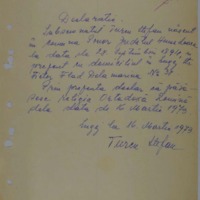 Letter requesting the right to leave the church
Letter requesting the right to leave the church 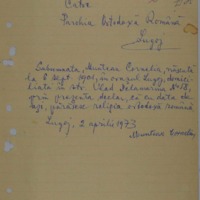 Letter requesting the right to leave the church
Letter requesting the right to leave the church 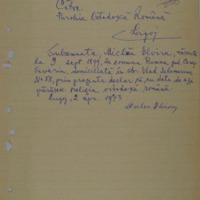 Letter requesting the right to leave the church
Letter requesting the right to leave the church 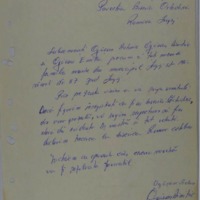 Letter requesting the right to leave the church
Letter requesting the right to leave the church 